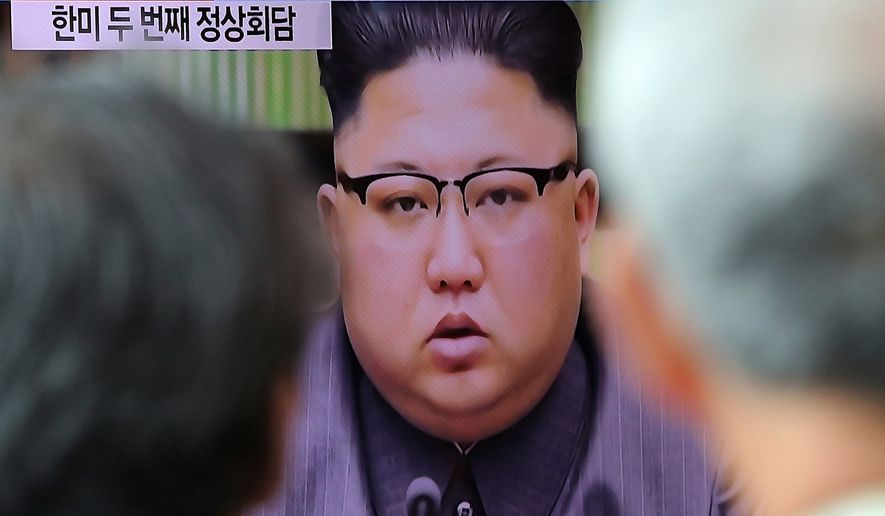Offering a rare insider’s account of life in the world’s most isolated and repressive nation, a top North Korean diplomat turned defector told a Capitol Hill hearing that President Trump should consider the unthinkable — direct talks with North Korean leader Kim Jong-un — as the best way to avoid all-out war on the Korean Peninsula.
Thae Yong-ho, Pyongyang’s No. 2 diplomat in Britain before defecting to the West last year, said Trump administration officials must hold direct talks with the North Korean leader to convince Mr. Kim personally that any military action against the U.S. and its allies would result in his country’s destruction.
“It is necessary to reconsider whether we have tried all nonmilitary options before we decide that military action against North Korea is all that is left,” Mr. Thae told members of the House Foreign Affairs Committee.
“Before any military action is taken, I think it is necessary to meet Kim Jong-un, at least once, to understand his thinking and try to convince him that he would be destroyed” if Pyongyang engages militarily with the U.S. or its allies in the region, he said.
Washington should also pair such talks with new rounds of economic and political sanctions “until the North Korean regime comes back to the dialogue table for denuclearization,” he said.
The onetime diplomat, the highest-ranking defector from the North in more than two decades, said the U.S. and its allies have yet to deploy all the “soft power” tools at their disposal, particularly at a time when the regime’s iron grip on the economy and the culture is showing signs of wear. State-sanctioned television programming, he said, is increasingly losing out to popular culture offerings from South Korean TV and Western movies and cartoons smuggled in on DVDs.
“Great and unexpected changes are taking place within North Korea,” Mr. Thae told lawmakers. “The changes make it increasingly possible to think of a civilian uprising in North Korea as more people are gradually informed of the reality of [their] living conditions.”
He added, “If we are determined to use and expand our soft power, I can think one day we can reach the same goal we achieved with former Soviet Union and those former East European socialist countries” and gain a victory while avoiding all-out war.
House Foreign Affairs Committee Chairman Edward R. Royce, California Republican, said the sanctions against the regime by the U.S. and the international community are bearing fruit.
“Our efforts are already putting pressure on the regime by creating some unrest and increasing defections,” Mr. Royce said. “The Kim regime is vulnerable.”
Whether the White House will take the advice is another matter. Mr. Trump faces a round of crucial diplomatic meetings in Japan, South Korea and China on the North Korea nuclear crisis when he embarks on a lengthy Asian trip this week.
Coaxing China
Washington has long sought to coax China into taking stronger actions to curb North Korea, which relies on Beijing as an economic lifeline. But China, Pyongyang’s main trade partner and sole patron in the international community, has been hesitant to push too hard because of fears of an abrupt, destabilizing collapse of the Kim regime.
Mr. Trump, as a presidential candidate, floated the idea of meeting with Mr. Kim provided the conditions were right but has engaged in an escalating war of words with the young North Korean leader that has unnerved capitals across the region. Mr. Trump’s threats in August to rain “fire and fury” on Pyongyang should it threaten American interests in the region prompted threats from Pyongyang to fire long-range missiles into the coastal waters near U.S. military installations on the island of Guam.
Mr. Thae argued that the North’s saber-rattling and nuclear and missile tests, combined with its low opinion of U.S. military firepower aimed at the regime, highlight the deluded nature of the regime’s foreign policy in general.
Unlike previous North Korean defectors who detailed the gross human rights violations by the regime against its people, Mr. Thae provided some context into how Pyongyang’s elite seek to press the country’s agenda on the world stage. Obtaining a credible nuclear capability that can threaten the United States is critical to that strategy, he said.
“Kim Jong-un genuinely believes that he can break the [U.S. and international] sanctions regime apart once he compels Washington to accept North Korea’s [nuclear] status” once the country’s long-range nuclear weapons capability goes operational, Mr. Thae said.
“Frankly, Kim Jong-un is not fully aware of the strength and might of American military power,” he added.
Although the regime may be showing increasing signs of vulnerability, Mr. Thae said, the U.S., South Korea and other countries in the region should not underestimate the North’s hair-trigger nervousness at any sign its survival is at stake.
“North Korean officers are trained to press the button without any further instructions from the general command if something happens on their side,” he said. “If there is any sound of fire or bomb or strike from Americans, the military artilleries and short-range missiles will fire against South Korea.”
• Carlo Muñoz can be reached at cmunoz@washingtontimes.com.




Please read our comment policy before commenting.